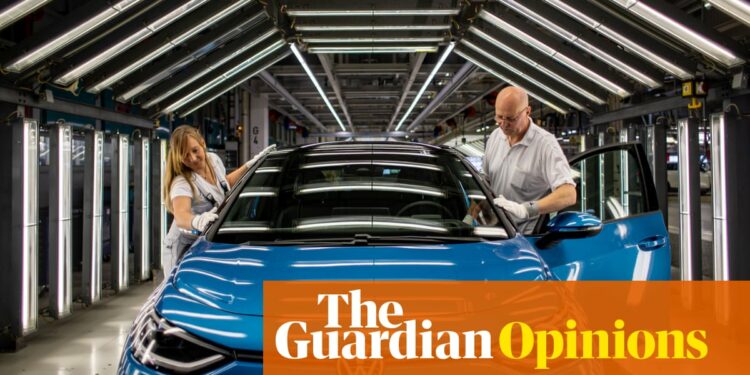Earlier this year, a French experiment offered a startling glimpse of what progressive green policymaking can achieve. In an effort to boost demand, Emmanuel Macron’s government introduced a social leasing scheme allowing less well-off commuters to pay an affordable monthly rate for a new electric vehicle (EV). Within a month, demand boomed to the extent that the scheme was abruptly suspended. According to ministers, French carmakers couldn’t keep up with the sudden surge of interest.
This autumn, companies such as Renault and Peugeot are facing a different kind of problem. Governments across the EU have withdrawn subsidies and incentives, and are failing to provide reassuring levels of investment in charging infrastructure and grid capacity. As a consequence, EV sales are badly off the pace in the journey to 2035 zero-emission targets. According to new data from the European Automobile Manufacturers’ Association, August recorded the fourth consecutive monthly drop in sales. Overall, car sales are at their lowest for three years, with double-digit falls in France, Germany and Italy. Executives at Volkswagen, a symbol of Germany’s industrial prowess, have declared an intention to close domestic factories for the first time in the company’s history.
Along with the cost of living crisis, and the relatively high price of EVs, a big part of the problem is competition from China. State subsidies and access to essential battery materials are allowing Chinese manufacturers to significantly undercut European companies, and just as importantly, to dominate their huge domestic market. The stakes could not be higher. If the travails of flagship national brands and economic powerhouses such as VW are not addressed, far-right parties such as the Alternative für Deutschland will be given further scope to attack green targets as a menace to national prosperity. Recognising the crisis, the European Commission is planning to impose heavy tariffs on Chinese EVs after a year-long anti-subsidy investigation.
This route, however, will create its own problems. A trade war with China will inevitably have damaging consequences for European exporters. That’s why Germany has opposed the planned tariffs. And taking action to keep cheap Chinese EVs out of the European market will do nothing to boost consumer demand – in a sector fundamental to the green transition.
In the face of farmer protests, the commission president, Ursula von der Leyen, has already retreated on some of the climate targets that defined her first term. As the next phase of the transition seeks to decarbonise essential elements of everyday life, including the cars we drive, going green needs to be seen as affordable for consumers, including the less well-off, and as a source of economic renewal and growth for European businesses and regions.
Brussels and proactive national governments should take the lead through a combination of subsidies and investment at scale to sustain industry and consumer confidence. This was the spirit of an analysis of Europe’s economic prospects by Mario Draghi, the former European Central Bank president, published last month. Yet as the EU reintroduces tight fiscal rules on national spending, the trajectory of policy is being determined by a shortsighted focus on balancing the books. Without a change of approach, the woes of the car industry are likely to deepen as it negotiates an era-defining transition.
Source link : https://www.theguardian.com/commentisfree/2024/oct/13/the-guardian-view-on-europes-struggling-ev-industry-driving-in-the-slow-lane
Author :
Publish date : 2024-10-13 19:15:00
Copyright for syndicated content belongs to the linked Source.



